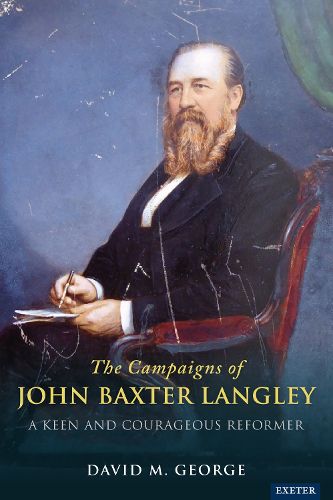Readings Newsletter
Become a Readings Member to make your shopping experience even easier.
Sign in or sign up for free!
You’re not far away from qualifying for FREE standard shipping within Australia
You’ve qualified for FREE standard shipping within Australia
The cart is loading…






This title is printed to order. This book may have been self-published. If so, we cannot guarantee the quality of the content. In the main most books will have gone through the editing process however some may not. We therefore suggest that you be aware of this before ordering this book. If in doubt check either the author or publisher’s details as we are unable to accept any returns unless they are faulty. Please contact us if you have any questions.
Once notorious but now largely forgotten, the political idealist and radical John Baxter Langley was typical of the well-educated and ethical Victorians who struggled to create a fairer, more equal society. Through a long and wide-ranging career of political agitation he was a journalist, editor and owner of several newspapers, was prominent in the call for franchise reform, and opposed religious legislation that prevented Sunday entertainment and education for working men and women.
Langley was also integral to the founding of a trade union, campaigned for an end to public executions and built affordable housing in Battersea. Internationally, he condemned the Second Opium War, exposed British brutality in India and worked covertly for Lincoln’s administration. He was a fellow-traveller for many other key radicals of the day, while his founding of the ‘Church of the Future’ garnered the support of Charles Darwin, James Martineau and John Stuart Mill.
Through a chronological narrative of Langley’s activities, this book provides an overview of many of the most significant political causes of the mid- to late nineteenth century. These include electoral reform, feminism, slavery, racism, trade unionism, workers’ rights, the free press, leisure, prostitution, foreign relations and espionage. A neglected but important figure in the history of nineteenth-century radicalism, this work gives John Baxter Langley the attention he deserves and reveals the breadth of his legacy.
$9.00 standard shipping within Australia
FREE standard shipping within Australia for orders over $100.00
Express & International shipping calculated at checkout
This title is printed to order. This book may have been self-published. If so, we cannot guarantee the quality of the content. In the main most books will have gone through the editing process however some may not. We therefore suggest that you be aware of this before ordering this book. If in doubt check either the author or publisher’s details as we are unable to accept any returns unless they are faulty. Please contact us if you have any questions.
Once notorious but now largely forgotten, the political idealist and radical John Baxter Langley was typical of the well-educated and ethical Victorians who struggled to create a fairer, more equal society. Through a long and wide-ranging career of political agitation he was a journalist, editor and owner of several newspapers, was prominent in the call for franchise reform, and opposed religious legislation that prevented Sunday entertainment and education for working men and women.
Langley was also integral to the founding of a trade union, campaigned for an end to public executions and built affordable housing in Battersea. Internationally, he condemned the Second Opium War, exposed British brutality in India and worked covertly for Lincoln’s administration. He was a fellow-traveller for many other key radicals of the day, while his founding of the ‘Church of the Future’ garnered the support of Charles Darwin, James Martineau and John Stuart Mill.
Through a chronological narrative of Langley’s activities, this book provides an overview of many of the most significant political causes of the mid- to late nineteenth century. These include electoral reform, feminism, slavery, racism, trade unionism, workers’ rights, the free press, leisure, prostitution, foreign relations and espionage. A neglected but important figure in the history of nineteenth-century radicalism, this work gives John Baxter Langley the attention he deserves and reveals the breadth of his legacy.